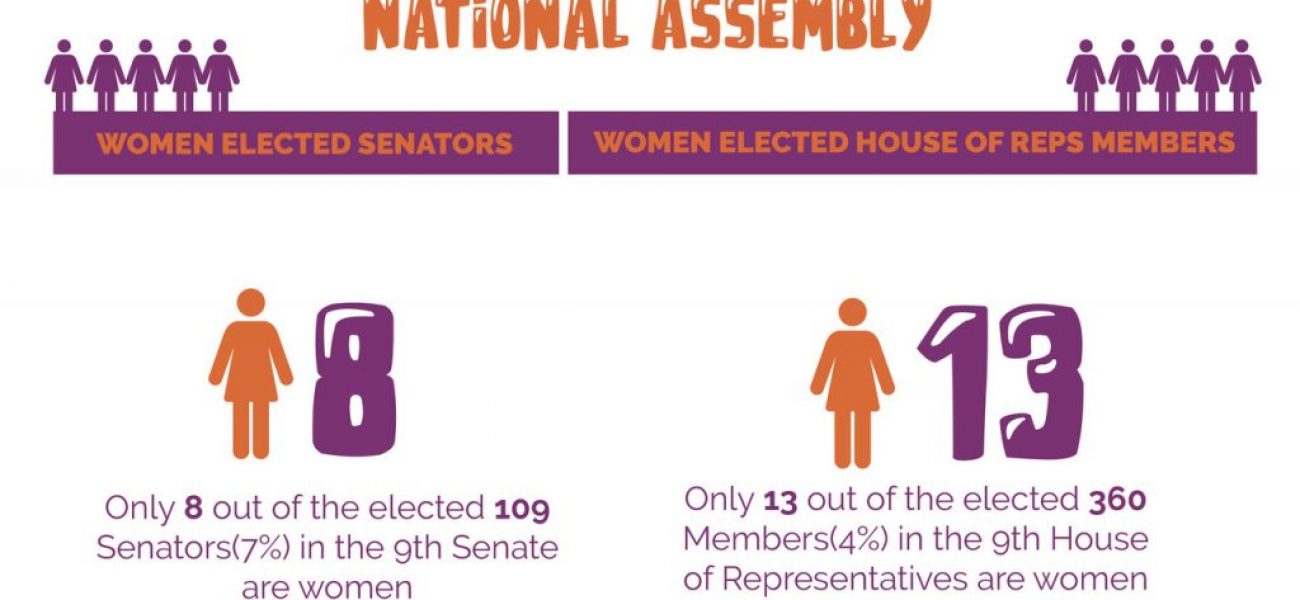The underrepresentation of women and other disadvantaged groups in politics have formed the basis of several public discourse around elections and political participation. The number of women in both appointive and elective positions at different levels of government are marginal at best, with the 2019 general elections seeing a decline in that number. Speaking at a conference hosted by a socio-cultural group for women, the Senate Minority Leader, Senator Enyinnaya Abaribe stated that Nigeria will get to a point where there will be no woman in the Senate if nothing is done to close the gender gap in politics. This statement echoes a plausible reality in the light of current circumstances.
In a bid to address the gender gap in political representation, a Bill to alter the 1999 Nigerian Constitution to create additional Special Seats for women in the Federal and State Legislative Houses has been introduced in the House of Representatives. The Bill is sponsored by Deputy Chief Whip of the House, Hon. Nkeiruka Onyejeocha, the Speaker of the House, Rt. Hon. Femi Gbajabiamila and 85 other members. It aims to create additional separate seats to be contested and filled by only women in the National and State Houses of Assembly as a temporary measure to promote women’s political representation.
The Bill proposes to amend section 48 of the Constitution, by creating one additional seat in the Senate for each State of the Federation and the Federal Capital Territory (FCT) to be occupied by a woman. If the amendment goes through, each State would be expected to return four Senators while the FCT will return two Senators. This would amount to a total of 37 additional female Senators. The Bill also proposes to amend section 49 of the Constitution to create two additional seats in the House of Representatives from each State of the Federation and the FCT to be occupied by only women. The implication is that each State and the FCT will have two women added to their already existing number of Representatives, amounting to a total of 74 additional Women Representatives. Furthermore, the Bill proposes to amend section 91 of the Constitution to add three seats to the number of existing seats in every State House of Assembly, to be occupied by women only. The three additional women-only seats are to be in accordance with the three Senatorial districts already delineated for each State.
According to the Bill, the creation of special seats however shall not prevent a woman from contesting for other regular seats in the various constituencies that make up the Senate, House of Representatives and State Houses of Assembly. It is also important to note that the bill does not create a superior or inferior legislative status for the special seats, as women occupying such seats would have equal privileges and responsibilities as other members.
The Bill seeks to amend sections 77 (1) and 117 (1) of the Constitution to subject the special seats to direct elections like every other legislative seat. In other words, the women must be voted for directly by constituents who are entitled to vote.
As a Temporary Special Measure, the bill contains a clause which mandates a review of the special seats after four general election cycles of 16 years, for repeal or renewal. The aim of creating special women-only seats is to devise a path devoid of impediments through which women can participate in mainstream politics/governance and build their power base, which will be instrumental to their continued participation when the temporary measure ends and a full reversion to regular seats is required.
A prominent criticism of this Bill is the potential increase in the cost of governance that will be occasioned by the creation of additional seats in the federal and state legislatures. This is further fueled by public opinion surrounding the budget of the legislature, particularly the National Assembly on one hand, and the current state and trajectory of Nigeria’s economy in recent times, on the other hand.
Policy and Legal Advocacy Centre (PLAC) conducted in-depth research on the possible quantitative and qualitative costs and benefits of the bill if implemented using the salaries and emoluments of legislators as approved by the Revenue Mobilisation, Allocation and Fiscal Commission (RMAFC) and information volunteered by some lawmakers (in the media) on their salaries and emoluments and other sources.
The research further measured these estimated costs against an average of the Federal Government’s last three (2019-2021) budget sums and found that the impact of additional legislators (219) on the Federal Government’s Budget is a percentage increase of between 0.0314% and 0.163%. This is a rather marginal increase.
As valid as the cost concern appears, the point is however made that the destiny of a nation cannot be surrendered on the altar of mere numbers as in cost and budget figures, but also on proper consideration of the value addition of the human resource in women who will bring on board unique perspectives in decision making, including suggestions that will ultimately cut down cost of governance and hopefully open new revenue sources.
In addition to the importance of having representation in governance that is reflective of the population, research has shown that there are intrinsic values that can be derived from having more women in governance. In some countries where special measures have been adopted to improve the number of women in legislative houses, there has been an increase in legislation that address social issues such as healthcare, education, women issues, poverty, violence, etc. Also, a United Nations Global study on the Implementation of United Nations Security Council Resolution 1325 shows that women inclusion in policy making often results in improved conflict management and reduced armed violence.
The bill if passed can potentially change the deteriorating trajectory of women’s political participation in Nigeria.

